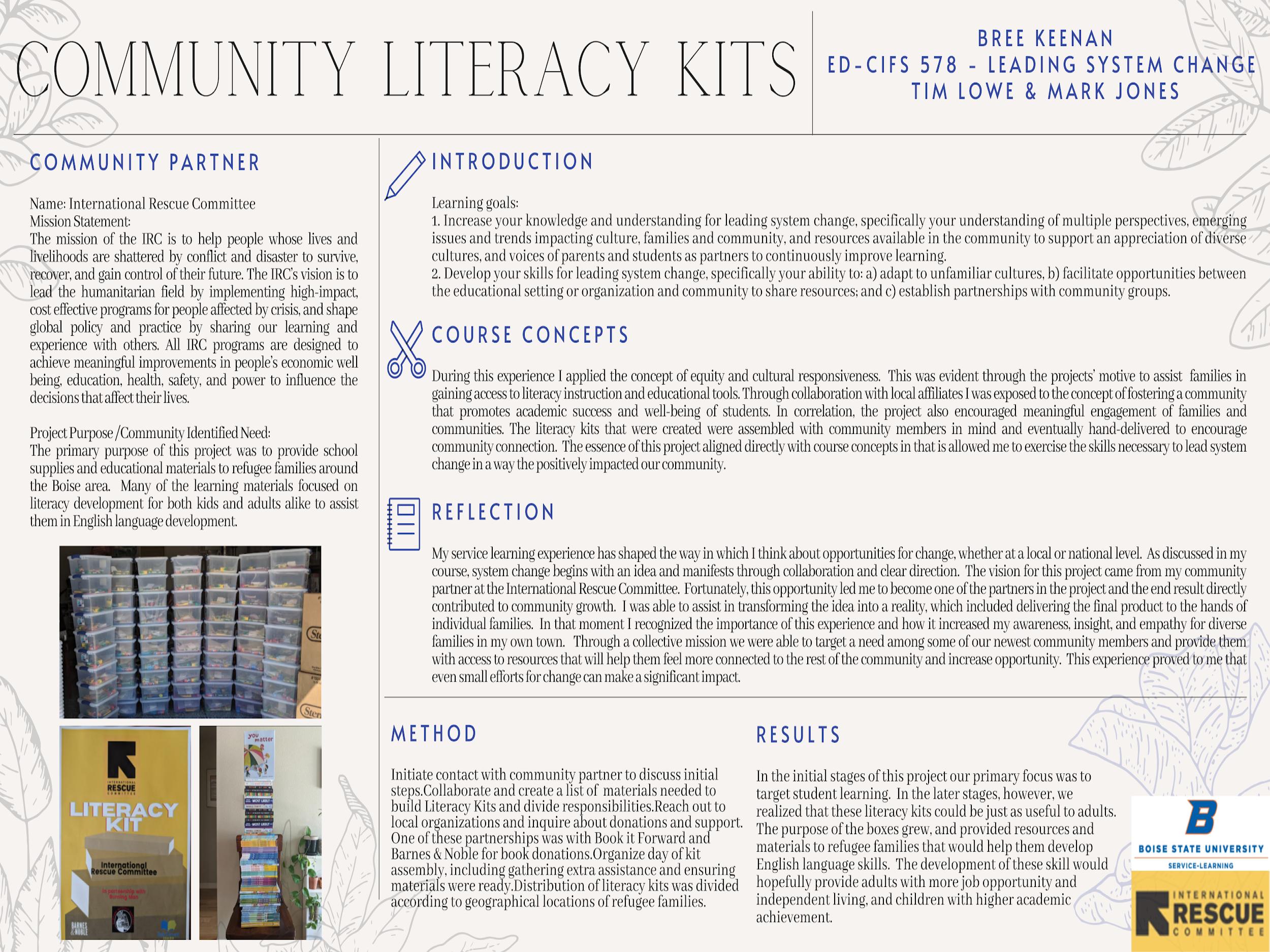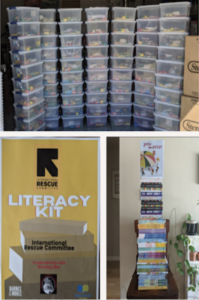Bree Keenan
Prof. Tim Lowe & Prof. Mark Jones – ED-CIFS 578
International Rescue Committee (IRC)

Introduction
Learning Goals:
- Increase your knowledge and understanding for leading system change, specifically your understanding of multiple perspectives, emerging issues and trends impacting culture, families and community, and resources available in the community to support an appreciation of multiple cultures, and voices of parents and students as partners to continuously improve learning.
- Develop your skills for leading system change, specifically your ability to: a) adapt to unfamiliar cultures, b) facilitate opportunities between the educational setting or organization and community to share resources, and c) establish partnerships with community groups.
Reflection
My service learning experience has shaped the way in which I think about opportunities for change, whether at a local or national level. As discussed in my course, system change begins with an idea and manifests through collaboration and clear direction. The vision for this project came from my community partner at the International Rescue Committee. Fortunately, this opportunity led me to become one of the partners in the project and the end result directly contributed to community growth. I was able to assist in transforming the idea into a reality, which included delivering the final project to the hands of individual families. In that moment I recognized the importance of this experience and how it increased my awareness, insight, and empathy for families in my own town. Through a collective mission we were able to target a need among some of our newest community members and provide them with access to resources that will help them feel more connect to the rest of the community and increase opportunity. This experience proved to me that even small efforts for change can make a significant impact.
Community Partner: International Rescue Committee
Mission Statement:
The mission of the IRC is to help people whose lives and livelihoods are shattered by conflict and disaster to survive, recover, and gain control of their future. The IRC’s vision is to lead the humanitarian field by implementing high-impact cost effective programs for people affected by crisis, and shape global policy and practice by sharing our learning and experience with others. All IRC programs are designed to achieve meaningful improvements in people’s economic well being, education, health, safety, and power to influence the decisions that affect their lives.
Project Purpose:
The primary purpose of this project was to provide school supplies and educational materials to refugee families around the Boise area. Many of the learning materials focused on literacy development for both kids and adults alike to assist them in English language development.

Course Concepts
During this experience I applied the concept of cultural responsiveness. This was evident through the projects’ motive to assist families in gaining access to literacy instruction and educational tools. Through collaboration with local affiliates I was exposed to the concept of fostering a community that promotes academic success and well-being of students. In correlation, the project also encourages meaningful engagement of families and communities. The literacy kits that were created were assembled with community members in mind and eventually hand-delivered to encourage community connection. The essence of this project aligned directly with course concepts in that it allowed me to exercise the skills necessary to lead system change in a way that positively impacted our community.
Method
Initiate contact with community partner to discuss initial steps. Collaborate and create a list of materials needed to build Literacy Kits and divide responsibilities. Reach out to local organizations and inquire about donations and support. One of these partnerships was with Book It Forward and Barnes & Nobel for book donations. Organize day of kit assembly, including gathering extra assistance and ensuring materials were read. Distribution of literacy kits was divided according to geographical locations of refugee families.
Results
In the initial stages of this project our primary focus was to target student learning. In the later stages, however, we realized that these literacy kits could be just as useful to adults. The purpose of the boxes grew, and provided resources and materials to refugee families that would help them develop English language skills. The development of these skills would hopefully provide adults with more job opportunity and independent living, and children with higher academic achievement.